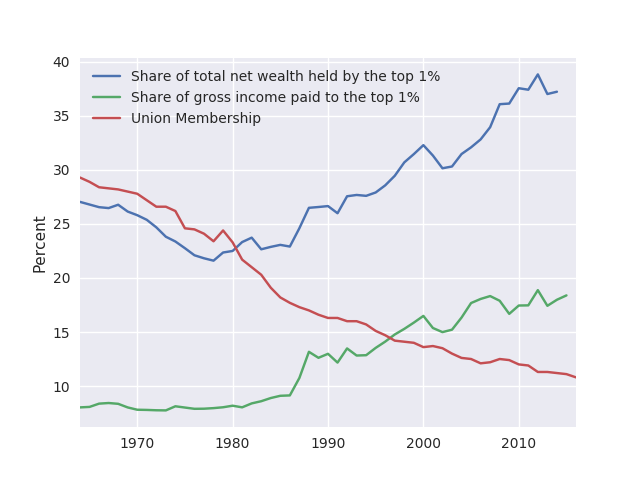data for politics #18: Unions are Good as Hell
By Colin McAuliffe (@ColinJMcAuliffe)
Far-right billionaires and politicians have long sought to undermine organized labor by restricting collective bargaining rights, and their efforts have paid off. The decline in union membership over the past several decades has been accompanied by increasing wealth and income inequality. Over the same time period, the portion of the national income going to compensation for labor has also decreased.
There is ample evidence that unions improve wages and benefits, even for non union members, but importance of unions as political institutions is often underestimated. A recent study found causal evidence that the introduction of right to work laws decreases democratic vote share in elections at every level in addition to reducing turnout. These laws strain the unions budget, and as a result diminish the capacity of unions to mobilize voters.
While union membership is at a historic low, their importance in politics is higher than ever. Individual states have different union membership rates, and while membership has declined in every state, the rate of decline differs from state to state. Changes in partisan voting patterns have resulted in an increased association between union membership and Democratic vote share. Below, we plot the union membership by state against the total statewide Democratic vote share in house elections from 1972-2016.
To illustrate the trend more clearly, we fit a multilevel model to these data, which shows that the association between union membership and Democratic Party vote share has gone from effectively zero in early 70’s to about 1 to 1 by 2010. The most rapid growth in the association occured after 1990.
While the recent supreme court decision in the Janus case is likely to further erode labor power, there is reason to hope. Massive teachers strikes in response to Republican austerity are already reshaping the political landscape in red states such as Oklahoma.
Republicans can win elections through a stew of appeals to white identity, xenophobia, and conspiracy theories. Democrats on the other hand need to build coalitions of demographically and economically diverse groups by addressing the material needs of their constituents. Highly educated suburbanites are emerging as an anti-Trump force, and Connor Lamb’s recent special election victory obliterates the conventional wisdom that white collar progressives and blue collar workers can’t coexist under one big Democratic tent. In fact, building a durable Democratic coalition that can win elections nationwide is going to require middle class progressives to recognize that strong unions are in their best interest, even if they do not work in unionized industries.
Colin McAuliffe (@ColinJMcAuliffe) is a co-founder of Data for Progress.
Interested in the data and code behind this post? You can find it here.




